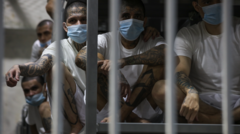In a controversial offer, El Salvador's President Nayib Bukele has proposed to return 252 Venezuelan deportees held in his country's notorious prisons in exchange for the release of an equal number of political prisoners from Venezuela.
El Salvador Proposes Venezuela Prisoner Swap: A Bold Humanitarian Move

El Salvador Proposes Venezuela Prisoner Swap: A Bold Humanitarian Move
El Salvador's President Nayib Bukele suggests a prisoner exchange with Venezuela involving US deportees.
The El Salvadorian president took to social media to address Venezuelan President Nicolás Maduro directly, highlighting the severity of crimes committed by the Venezuelans involved, including rape and murder, while contrasting them with the political motivations behind the imprisonment of many Venezuelans under Maduro's regime.
Bukele stated, "I want to propose you [Maduro] a humanitarian agreement calling for the repatriation of 100% of the 252 Venezuelans who were deported, in exchange for the release... of the identical number from among the thousands of political prisoners that you hold." He also referenced nearly 50 prisoners from other countries, including US citizens, as part of this potential swap.
Venezuelan chief prosecutor Tarek William Saab quickly rejected Bukele's proposal, demanding clarity on the crimes alleged against the deportees and whether they had received due process. The Venezuelan government asserts that it does not recognize the existence of political prisoners, a claim that is met with significant skepticism from international human rights organizations.
In recent weeks, more than 200 Venezuelans have been deported from the US to El Salvador, where they are reportedly linked to the Tren de Aragua criminal gang. The US has financially supported El Salvador to maintain these deported individuals in its high-security facilities.
Bukele, who has garnered fame for his steadfast stance against gang violence, was re-elected last year with strong public support for his rigorous anti-gang policies. Meanwhile, Maduro has condemned the US's deportation strategy, labeling it as an egregious violation of human rights.
As President Trump’s administration grapples with legal challenges on its immigration policies, a recent ruling by the US Supreme Court has temporarily paused the deportation of a different group of alleged Venezuelan gang members. The Trump administration's use of the 1798 Alien Enemies Act for mass deportations has drawn criticism, as it bypasses standard legal processes.
Bukele stated, "I want to propose you [Maduro] a humanitarian agreement calling for the repatriation of 100% of the 252 Venezuelans who were deported, in exchange for the release... of the identical number from among the thousands of political prisoners that you hold." He also referenced nearly 50 prisoners from other countries, including US citizens, as part of this potential swap.
Venezuelan chief prosecutor Tarek William Saab quickly rejected Bukele's proposal, demanding clarity on the crimes alleged against the deportees and whether they had received due process. The Venezuelan government asserts that it does not recognize the existence of political prisoners, a claim that is met with significant skepticism from international human rights organizations.
In recent weeks, more than 200 Venezuelans have been deported from the US to El Salvador, where they are reportedly linked to the Tren de Aragua criminal gang. The US has financially supported El Salvador to maintain these deported individuals in its high-security facilities.
Bukele, who has garnered fame for his steadfast stance against gang violence, was re-elected last year with strong public support for his rigorous anti-gang policies. Meanwhile, Maduro has condemned the US's deportation strategy, labeling it as an egregious violation of human rights.
As President Trump’s administration grapples with legal challenges on its immigration policies, a recent ruling by the US Supreme Court has temporarily paused the deportation of a different group of alleged Venezuelan gang members. The Trump administration's use of the 1798 Alien Enemies Act for mass deportations has drawn criticism, as it bypasses standard legal processes.


















